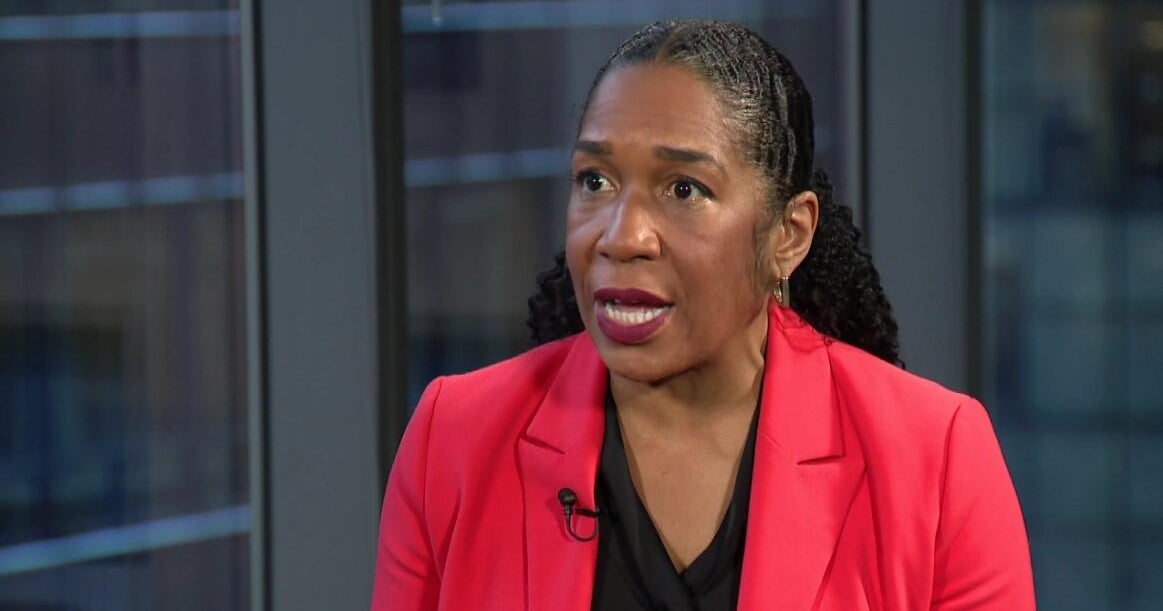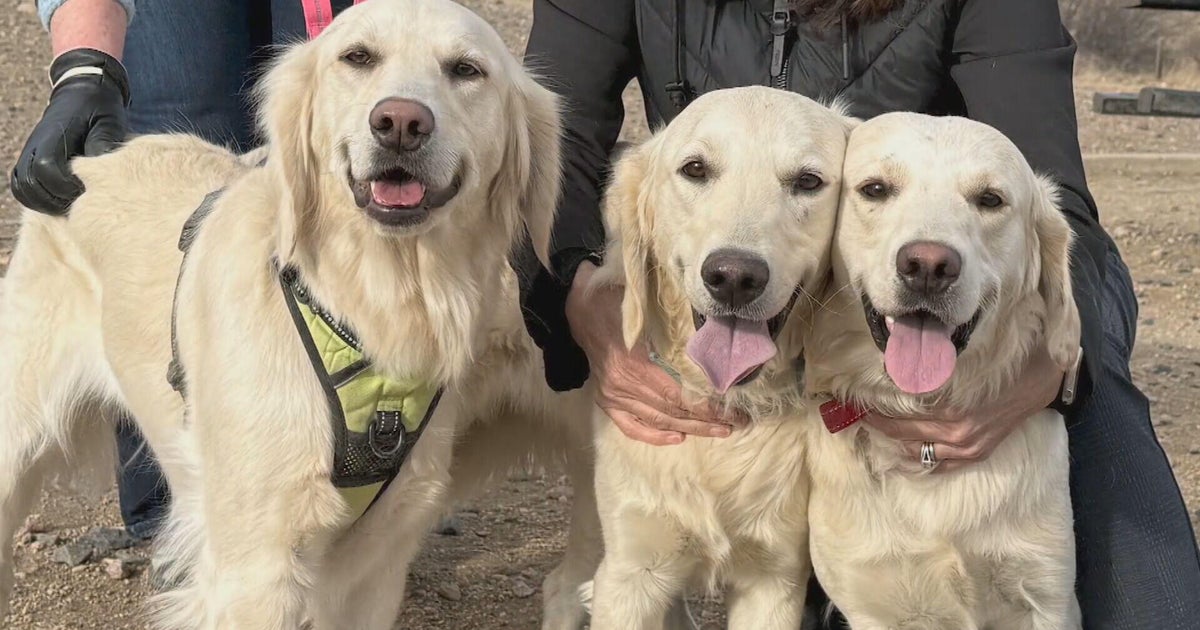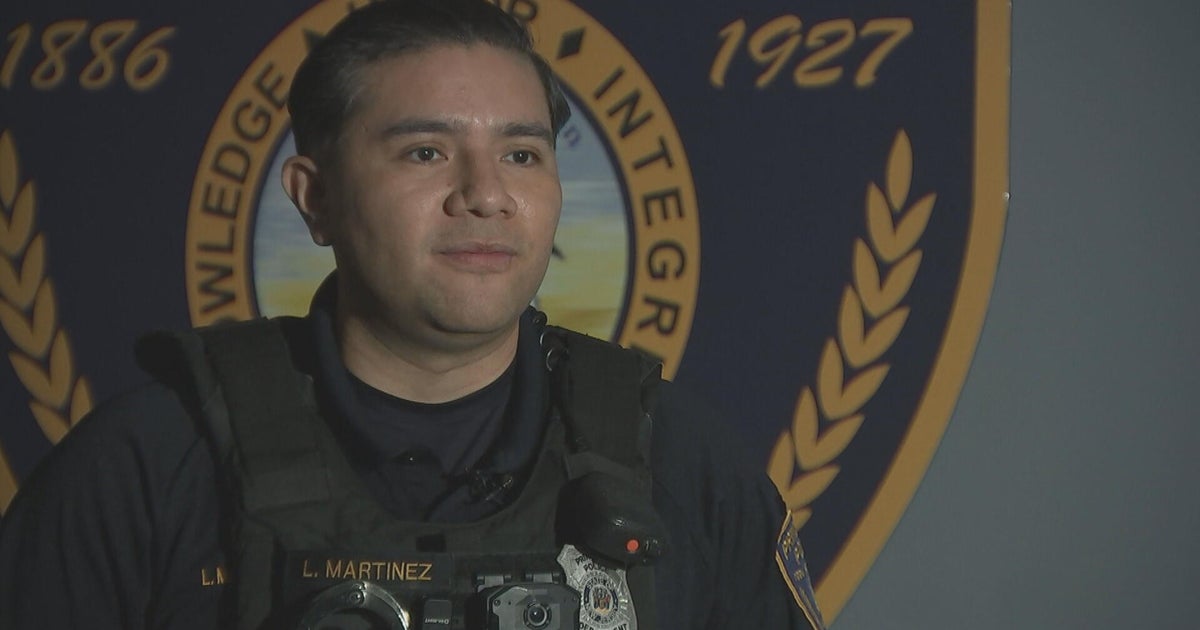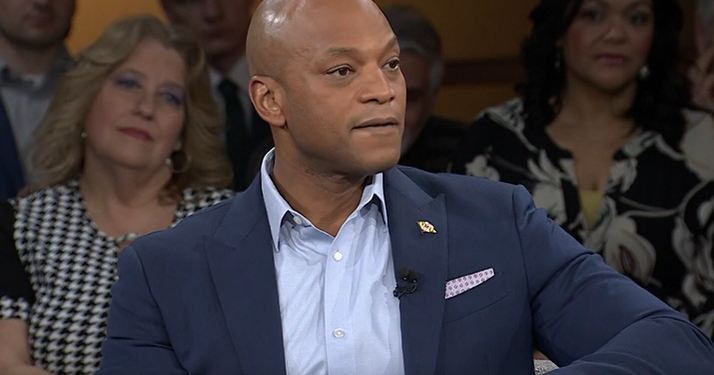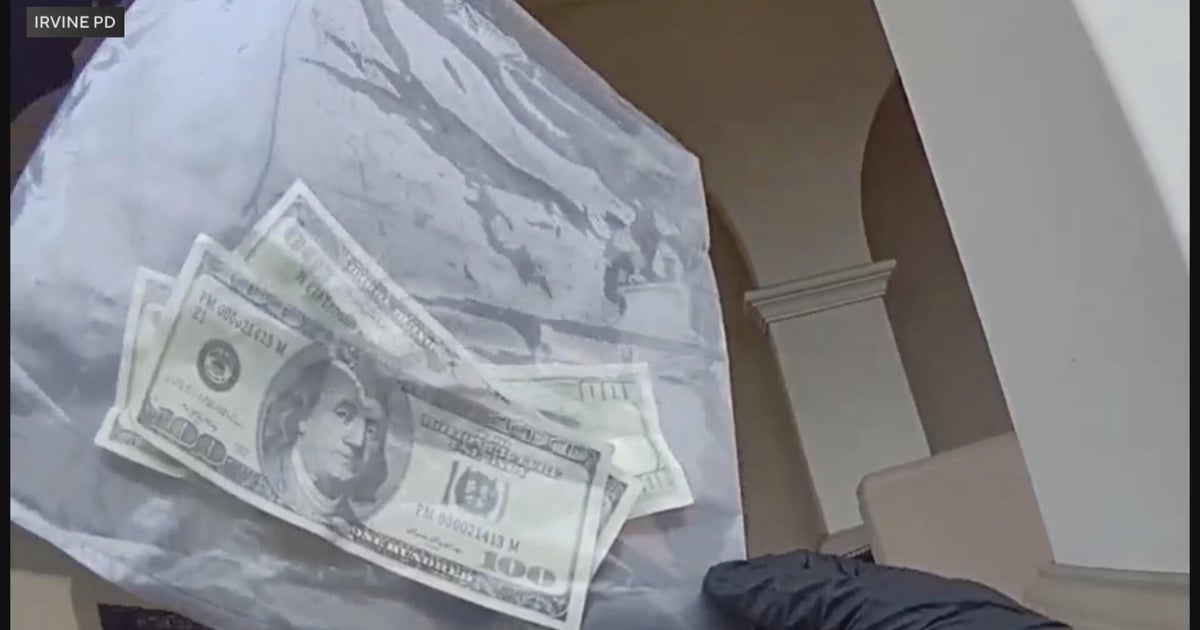Chicago Decides: mayoral candidates Brandon Johnson and Paul Vallas face off at CBS 2 debate
With one week to go before Election Day, mayoral candidates Brandon Johnson and Paul Vallas faced off at another debate Tuesday evening, hosted by CBS 2.
CBS 2 Chicago along with our partners, the Business Leadership Council, Chicago Urban League, National Association For Black Journalists Chicago, and WVON hosted the mayoral debate.
A full breakdown can be found below.
Watch the full debate
A deep dive into two key questions
A day after the debate, CBS 2 Political Investigator Dana Kozlov took a closer look at two key topics that came up. Kozlov notes the debate further highlighted that while in some ways Vallas and Johnson are very different, they also agree on many issues.
On safety, Sargent was able to pin down Johnson to acknowledge that at one point, he did suggest police should be defunded. But he clarified that now, he wants to direct police budget money to other policing programs – such as alternative responders and consent decree training.
"I'm not going to defund the police. What I've said repeatedly is that the $150 million should be appropriated towards making sure that we are doing smart policing – which includes training and hiring and promoting 200 more detectives, implementing the consent decree, making sure that we are providing mental health services for police officers," Johnson said.
Vallas said on safety: "What you need to do in all of our communities is you need to restore community-based social services. You need to open our campuses through the dinner hour; school campuses on the weekends, over the summer, and holidays so that young people can be engaged in work-study opportunities. You need to have re-entry programs for returning citizens, and you need to restore the concept of police integrity – or beat integrity, I should say."
Another topic we asked about is water bills. For four years, the CBS 2 Investigators have reported on Chicagoans Getting Hosed by errors and issues with their water bills.
In many cases, residents of Black and brown communities have been socked with bogus bills that run into the tens of thousands of dollars.
Vallas and Johnson both point fingers at the Chicago Department of Water Management – and vow to fix the mess.
Vallas called for "bringing new leadership into the Water Department, as well as the other regulatory departments – because clearly, the Water Department has been managed incompetently. Secondly, by providing amnesty – by providing amnesty for those who have these immense liabilities – whether it's water bills, whether it's parking ticket bills, whether it's red-light camera bills in these debts."
Johnson said: "Water bills, look – it requires someone to be competent; to actually have the ability to hire and recognize people who have the ability to make sure that government works, and every single department that has demonstrated incompetence under my watch, we shift that dramatically."
On Wednesday, Kozlov sat down with Vallas for a final one-on-one interview before the election. Kozlov extended the same invitation to Johnson, and hopes he will agree sometime before Election Day.
Panelists kept Johnson, Vallas on point
Brandon Johnson and Paul Vallas covered a lot of ground in a lively debate Tuesday night, and tried to set themselves apart. Now is the time to do so – considering the election is next week.
As they have done in the past, both candidates often tried to stay on message and not specifically answer some questions. But our panelists kept them on point.
WVON's Rufus Williams first focused on new comments by Fraternal Order of Police President John Catanzara that if Johnson is elected, there will be "blood in the street." Johnson dismissed the comment as ridiculous, and then segued into the FOP's support of Vallas.
"It actually speaks to the type of candidacy that my opponent is running – someone who is supported by the extreme right wing, and has caused tremendous turmoil and divisiveness," Johnson said.
Williams asked Vallas to describe the influence the FOP will have on managing the city.
"Well first of all, none," Vallas said, "and let me point out that I've never taken any more from the Fraternal Order of Police – unlike my opponent, who's still on the payroll for the Chicago Teachers Union."
Johnson was likewise asked about his ties to the CTU. Williams asked, "How can taxpayers be comfortable that you will negotiate in their best interests, and not with loyalty to the Chicago Teachers Union?"
"I'll the fiduciary responsibility to make sure I'm protecting the interests of all taxpayers," Johnson said.
Policing also took center stage for a big chunk of the debate. CBS 2's Irika Sargent pushed Johnson on comments he made during a 2020 forum focused on fighting for a police-free future – in which he applauded organizers' goal of moving away from state-sponsored policing.
Johnson first said he did not intend to defund the police. When Sargent repeatedly asked Johnson to acknowledge he had made the comments she quoted about defunding police, Johnson eventually said, "You've already quoted," and, "Of course I'm acknowledging."
Johnson went on to say he does not want to defund the police, but to direct funds to other policing-related programs – such as alternative responders.
Vallas was asked how, realistically, he could increase Chicago Police officer ranks by more than 1,000 in a short period of time, as he has claimed he will do.
"I'm suggesting – and I've said this time and again – that you can immediately restore hundreds of officers," Vallas said. "You can also slow the exodus of officers."
There was a rare, but clearly terse moment in which Vallas said Johnson would retire with a Chicago Public Schools teacher's pension despite having been a teacher for only four years.
Johnson fired back, "And we're going to retire you in three days."
There were also some interesting personal moments. Before we went on the air, Vallas wished Johnson a happy birthday. At the end of the debate, Vallas said, "We're really friends."
Read below for a full breakdown of the debate.
Vallas fires at Johnson during closing statement
Johnson kept the tone aspirational and did not launch any attacks in his closing statement, but Vallas did fire at Johnson.
In his closing statement, Johnson said, "We are building an opportunity for the city of Chicago to finally turn the page on the politics of old that have failed people."
He said everyone would have a seat at the table, and emphasized that he values hope over fear.
Vallas, however, said there has "never been a greater defining difference" between him and Johnson.
"I want to restore the police ranks and return to constitutional-based, consent-decree-enforced community policing. My opponent wants to defund the police," Vallas said. "I want to tackle the $20 billion budget that the mayor controls – including accessing and redistributing TIF monies – to balance the budget to provide basic services. He wants to increase taxes by $800 million."
Johnson said even earlier in the debate that he does not seek to defund the police, but the debate ended after Vallas' statement.
Speed round
In a "speed round" of questions at the end of the debate, both candidates were asked for simple yes or no answers to several questions.
Question: Qualified Immunity shields law enforcement from being held personally liable for constitutional violations like excessive use of force. Do you support qualified immunity?
Johnson and Vallas both said yes.
Question: Do you support reparations for descendants of Black slaves?
Vallas and Johnson both said yes.
Question: The Anjanette Young Ordinance would require new rules for search warrants including banning no knock warrants Will you support the ordinance?
Johnson and Vallas both said yes.
Question: Do you support a South Suburban airport, yes or no?
Vallas and Johnson both said yes.
Question: Are you for or against speed cameras?
Johnson: "I'm for phasing them out, if it constitutionally allows us to do it, and if we can't, wherever at ticket has been accumulated or acquired, that Zip code should get the revenue."
Vallas jokingly asked if he could also give more than a one-word answer, and when told yes, Johnson quipped "see how I'm already leading the way? You're welcome, Mr. Vallas."
"Thank you very much," Vallas said. "Great. We're really friends, believe it or not."
As to the question, Vallas said, "I believe that speed cameras should be around school districts, particularly during school time, but I believe we should phase out speed cameras."
Question: What's one thing you love about Chicago?
Vallas: "Its diversity. The diversity of its neighborhoods. We're basically a city of communities."
Johnson: "Oh, there's so many things to love, but only one? The way people of Chicago love one another."
Question: What's one thing you hate about Chicago?
Johnson: "Do I have to tell you which baseball team I root for?"
That's actually a question for later.
"I don't think there's anything I hate about the city of Chicago. There are some things I wish would be better," Johnson said.
Vallas: "The same."
Question: What's the first issue you would fix in office?
Vallas: "Public safety."
Johnson: "I want to restore confidence in government and the office of the Mayor?"
Question: Cubs or Sox?
Johnson: "We only had WGN growing up, how's that?"
Johnson asks Vallas about proposal to invite back officers who left CPD
For his question, Johnson asked Vallas to respond to a comment by the former chief of staff of the Chicago Police Department, who said Vallas' promise that more officers will return to the force if he's elected is "naïve."
Vallas defended his claim that hundreds of officers would return to Chicago who either retired or joined other agencies. He said the officers would "rejoin the ranks if they are not ... penalized."
Vallas's campaign has said if elected, he would invite officers who've left the department within the last three years to return to work in Chicago with "no loss of seniority from the day they left." He's also called for adjusting the city's background check process, within the boundaries of the consent decree, because it weeds out too many "quality applicants."
Vallas asks Johnson about his tax plan to raise revenue
Both candidates were given the opportunity to ask each other one question. Vallas asked Johnson how his plan to raise revenue with a "city income tax" is going to work.
Johnson denied that his tax plan includes an income tax.
"I know your Republican donors are using lies to disparage me, but you should be able to tell the truth," Johnson said responding to the question.
While Johnson said he aims to eliminate the "structural deficit" without raising property taxes, he did not go into detail about how he would raise city revenues. His campaign has called for new taxes on large corporations which do at least half of their business in the city, a tax on airlines, and a "mansion tax" on high-value properties.
Johnson blasts Vallas for belittling his teaching record; "You gotta stop doing that"
Johnson chided Vallas for dismissing his four years as a teacher at CPS.
"The fact that he's being dismissive of a Black man who taught for four years at Chicago Public Schools is … you gotta stop doing that Paul, you just do," he said. "I got elected, I've been an organizer, I know how to put together a plan, and my plan is very clear. We're going to have an administration that is compassionate, collaborative, and competent. These are the skillsets that I've brought to every single dynamic that I've done in the city of Chicago and throughout my career."
"I'm criticizing his leadership ability and his lack of management competency, that's what I'm questioning, not his four years as a teacher," Vallas said.
"Then don't bring it up," Johnson shot back.
As Vallas noted that Johnson will qualify for a full pension despite working as a teacher for only four years, Johnson shot back "we're going to retire you in three days."
Vallas, Johnson on how they will appeal to whole city after election
WVON's Rufus Williams emphasized that no matter how it concludes, race is of consequence in this election. Both candidates were asked how they will appeal to all citizens of the city after this election is over.
Johnson said, "We're doing it now," pointing out that his coalition of support is composed of people who are Black, brown, and white; young and old; working class and middle class.
"I want everybody at the table, because the table is big enough for everyone," he said.
Johnson also noted that he was polling at only 2.3 percent back in October.
"No one thought I had a chance, but yet here I be," he said.
Vallas said he would bring Chicagoans of all demographics together by focusing on what people of all demographics would want and need – including public safety, police accountability with the consent decree, and directing CPS resources to local schools.
He noted that he is polling very well in every single ward.
Candidates asked for potential solutions to city's water billing problems
CBS 2 has reported extensively on systemic problems in city government, with major impacts on Black and Brown residents, including multiple instances of people being overbilled for water by thousands and even tens of thousands of dollars, while getting no real answers or commitments to fix the problem.
Both candidates were asked what they would do to fix those issues, and if they would commit to having a solution in place during their first year in office.
Vallas said the city needs to provide "amnesty across the board."
He also said the Water Department and other regulatory agencies need new leadership, saying the Water Department has been run incompetently.
"I think you need to provide forgiveness across the board, because much of that money is not going to be collected anyway," he said.
Johnson said the city needs to hire people to "make sure government works."
"I've actually have been elected to make government work, not Paul. He hasn't," he said.
Johnson to Vallas: 'We're going to retire you out in three days'
The Lightfoot administration has come under fire for making sure migrants have a place to stay while ignoring homeless people in our own city. The candidates were asked their plans to address the increase in homelessness.
Johnson said he supports the Bring Chicago Home Ordinance to end homelessness in Chicago. The program in part aims to restructure ethe real estate tax to create a revenue stream for permanent affordable housing.
He also called for programs to help people achieve home ownership, and the construction of public housing.
"As Paul has reminded everyone, I've been a teacher – not him," Vallas said. "I know what it's like when children come to school and they're hungry; they're tired."
Vallas said he would use Tax Increment Financing funding for affordable housing, and use eminent domain to acquire unoccupied residential buildings and turn them over to developers with grants.
Vallas also got defensive over a comment that he was criticizing Johnson's time as a teacher. But he did point out that Johnson was only a CPS teacher for four years and would be able to collect retirement as a teacher.
"We're going to retire you out in three days," Johnson said.
Johnson and Vallas discuss plans for addressing property taxes
Vallas has pushed for capping property tax increases at 3% by working with the Cook County Assessor and passing state legislation. Given the often lengthy legislative process and challenges of reaching agreement in Springfield, Vallas was asked how he plans to accomplish this and when will homeowners actually see the results of this legislative push?
Vallas claimed there is already authority available to cap property tax assessments, but said the threshold is too high.
"Simply amending that property tax assessment capping power is something that you could do, and it would be a top agenda item," Vallas said, claiming home and business owners would see relief immediately if assessment increases are capped at 3% a year.
Johnson criticized Vallas' remarks, saying "if people just heard my opponent talk and didn't understand what he's talking about, it's because it didn't make any sense."
With many homeowners at risk of losing their homes because they can't afford property taxes as they stand now, Johnson was asked how he plans to change that.
Johnson said he's vowed not to raise property taxes, and blamed the structural deficits the city and CPS are facing now on Vallas working to skip pension payments and use the funding for general operations.
"It's a disaster. We're talking about a $2.5 billion property tax bill that we are stuck with because he's bad at it," Johnson said.
Vallas shot back that Johnson worked as a teacher for only four years, and claimed he's never managed a budget, but has only voted for Cook County budget plans as a county commissioner.
Vallas also claimed that he froze the city's property tax levy as city budget director, and capped CPS property taxes as CEO, and left CPS with pensions fully funded.
"That does not happen if you're kicking the can down the road," he said.
Candidates outline plans to foster economic development in Black neighborhoods
With Income and wealth gaps between Black and white Chicagoans being wider than ever, both candidates were asked what their priorities would be for community economic development in Black neighborhoods.
Vallas emphasized plans for a community investment fund to allocate city resources fairly, and also called for the use of city purchasing power engage Black-owned businesses, and for the creation of an office of Black Chicagoans.
Johnson said under his administration 50 percent of city economic development contracts would go to minority- and women-owned businesses, with a goal of 30 percent going to Black-owned businesses. He also emphasized that legacy contractors would be held to the same standard as contractors newly brought on.
"Under my administration, you won't have to prove your worth if you're a Black business," Johnson said.
Candidates questioned on plans to revitalize downtown
Both candidates were asked about their plans for revitalizing the downtown area and reversing an exodus of businesses from the city's Central Business District, noting a 26% vacancy rate on the Magnificent Mile, and more than 28% on State Street.
Vallas said the city has to improve public safety, especially on the CTA, and called for restoring hundreds of police vacancies, saying fears of crime are strangling businesses.
"Then the issue of property taxes. There's an absence of financial predictability," he said.
Johnson said empty businesses downtown provide an opportunity to bring in new companies.
"There are biotech companies that are prepared and ready to come here," saying the city also has opportunities to boost life sciences, logistics, and digital manufacturing businesses.
Johnson also agreed that improving public safety is important for revitalizing downtown.
"It's not a one-trick pony here. You have to actually create a safe environment for people to want to actually do business in the city of Chicago," he said.
Johnson said he's also the best candidate to bring people together.
"We have to re-frame our definition of what leadership is," he said.
Johnson, Vallas explain how they would fund Invest South/West program
The current Invest South/West initiative focuses on development in historically underserved South and West sides of Chicago. Both candidates have said they would work to expand it – and were asked how they would fund such an expansion.
Johnson said he would pump $500 million more into the Invest South/West initiative – and as to how he would fund it, "I'm the only person who's released a budget plan."
"Democrats – and I'm a Democrat – believe that corporations and millionaires and billionaires have to pay their fair share of taxes," Johnson said – adding that he believes his proposed real estate transfer tax, corporate head tax, and $1 per night per room hotel tax hike would be worth it to revitalize communities.
Vallas said he would take a multi-pronged approach – including the use of funds from Tax Increment Financing districts and casino revenues, and depositing developer fees into a community investment fund.
He also called for a program in which vacant properties would go to developers with big abatements.
Vallas denies saying teaching Black history year-round "distracted from quality instruction in the core subject areas"
Vallas was asked about a 2021 interview on the Wirepoints podcast, in which he said that while CPS did teach African-American history year-round, he "thought it distracted from quality instruction in the core subject areas" and implied that curriculum such as Black history is "divisive."
Pressed to explain those statements, Vallas said "I made no statements of the sort."
"I not only integrated Black history into the curriculum so that it was just not taught in a single month, but it was taught year-round," he said, claiming he also brought African history into the world history curriculum, and mandated Black history as a requirement for graduation.
Vallas pressed on education record; Johnson asked how he'll pay for his education plan
Vallas was asked about his record running schools in New Orleans and Philadelphia after completing his tenure as CEO of Chicago Public Schools, and a track record showing he has not improved outcomes for the lowest performing students.
However, Vallas contended "that's absolutely false."
"Not only did we increase test scores in both language arts and math in Chicago over six consecutive years," he said, claiming that Philadelphia schools tripled math scores and doubled reading scores in nine years under his leadership.
He also said, in New Orleans, 110 of the 120 schools had been destroyed or badly damaged by Hurricane Katrina when he took over.
"I literally had to build a district from the ground up. I had 90 days to build 22 campuses … and find 700 teachers," claiming that district led the state in academic improvement for 6 to 7 years.
"All three districts had phenomenal growth," he added.
However, moderators stressed that data shows the lowest performing children did not show improvement under his watch, and asked how he would improve outcomes for all students in CPS.
While again challenging that data, Vallas said he would "decentralize" funding for CPS, claiming only 60% of its funding finds its way into the classroom. He also repeated his push for school buildings to remain open through dinner hours and on weekends, the holidays, and summer months to bring in trade unions for work study programs for students.
"We would keep young people fully engaged," he said.
Johnson, who has spoken of fully funding schools irrespective of enrollment, opposed losing under-enrolled schools, called for adding behavioral therapy programs, and robust programming to address student trauma, was asked how he planned to finance those initiatives.
Johnson said he has fought to base the funding formula for schools on need, rather than a per-pupil basis, claiming it would provide an additional $1.2 billion for CPS.
"We literally have enough money for everyone in the city of Chicago when it comes to public education," he said. "There is more than enough to make sure that we are fully funded in our schools, fully invested in every aspect of their development."
Preventing sexual abuse in schools: Johnson focuses on investment, Vallas on enforcement
We have reported on students being sexually assaulted by other students in the Chicago Public Schools – and allegations of administrators and teachers ignoring claims of abuse or shaming the victims.
Just last year, there were at least three cases in which the CPS agreed to settlements amounting to nearly $3 million. Separately, an Inspector General report showed more than 400 sexual complaints against CPS employees from students in 2022.
Johnson said stopping sexual abuse in schools requires fully investing in neighborhood schools and ensuring social workers, counselors, and therapist are available.
"Schools should be a safe space for children and their families," Vallas said.
He added, "A lot of times, what happens is, unfortunately, trust is broken – and this happens in all of our systems."
Vallas says the underlying problem is a lack of enforcement. He said cases of sexual abuse in CPS schools are being identified, but the investigations are not being completed.
"Where the district seems to be falling down is, in fact, not falling through on those investigations," Vallas said.
Johnson: 'I never said I'm going to cut the police budget'
Johnson has spoken on multiple occasions on the topic of defunding police. In 2020, he said on a radio show that redirecting money to "defund this failed system of incarceration and policing was not just admirable but necessary." The same year, he participated in a Town Hall on a "police-free future." As a Cook County Commissioner, he introduced a resolution that passed to redirect money from the sheriff's office to other areas.
When CBS 2's Irika Sargent asked Johnson if he acknowledged making those statements, Johnson first said, "I'm not going to defund the police."
He later conceded that he had made the statements, saying, "You've already quoted" them.
Johnson also said he had not made an about-face in now saying he is not going to take a penny away from the Police Department. He said he had never proposed redirecting $150 million away from the CPD – but rather had proposed dedicating $150 million to specific missions such as enforcing the consent decree mandating police reforms.
"I never said I'm going to cut the police budget," Johnson said. "The press has said it."
Johnson said he would fill the 1,600 vacancies in the department, and those who wish to become police officers will be hired. But he criticized as unrealistic Vallas' proposal of bringing on 1,600 police officers right away.
"This notion that 1,600 police officers are going to fly out of the air overnight is false," he said.
Meanwhile, Vallas was asked how he would bring up the CPD ranks back to 13,500 officers when there is a nationwide shortage. He replied that as city budget director in the early 1990s, the CPD ranks swelled from 11,800 to 13,500 in a year to a year and a half.
He added that 300 retired officers and "well over 100" officers who have transferred to other departments are willing to come back. Vallas also emphasized the need to stem the tide of officers' departure.
Vallas vows zero tolerance on police misconduct, Johnson pushes more focus on crime prevention measures
Per The Chicago Crime Lab, the North Side is as safe as it has been in a generation. The four North Side police districts had a homicide rate in 2021 of 3.2 residents per 100,000 people. The city's most dangerous neighborhoods are on the West Side – Garfield Park, Austin and North Lawndale – and the South Side – Washington Park, Englewood, Grand Crossing, Riverdale and South Shore.
Vallas, who has focused his campaign largely on public safety, was asked how he plans to reduce crime on the South and West Sides.
"What you need to do in all of our communities is you need to restore community-based social services," he said.
Vallas said school campuses should be open until dinnertime and on weekends, as well as the summer and holidays, to offer work study programs. He also called for "restoring beat integrity" at CPD by moving more officers to beat patrols and reduce response times to 911 calls.
Asked how he sees that approach working given the fractured relationship between police and the communities they serve, Vallas said he has been able to negotiate contracts with multiple labor unions, and said he is committed to fully enforcing the court-mandated reforms to CPD under a consent decree, and to establishing a zero tolerance policy for misconduct.
"I think that will help build the relationship with the community," he said.
Johnson, who lives in the Austin neighborhood, was asked how he plans to improve safety for every Chicago neighborhood beyond his commitment to addressing mental health in the city.
Noting he might be the first mayor to live in one of the city's most violent neighborhoods, if elected, Johnson said his public safety plan is focused on "investing in people" by spending more on mental health services, jobs, and crime prevention programs.
"Which would you prefer? To have your crimes solved, or your crime prevented? As mayor of the city of Chicago, I'm working to make sure that we're preventing crime, and no one has more incentive on this stage to get that right than me," he said.
Vallas says it was a mistake to attend Awake Illinois fundraiser
Vallas participated in a fundraiser for the far-right group Awake Illinois in June of last year – a short time after he declared his candidacy for mayor. Awake Illinois made widely documented homophobic and transphobic statements and opposed COVID safety measures in schools. He was asked why he supported that fundraiser – at a time when every decision he makes counts, and when voters likely expect that he is being very strategic with giving his time to events as a mayoral candidate.
He said he does not support Awake Illinois, and he was invited to the fundraiser by a school choice group without realizing Awake Illinois was one of the organizations sponsoring the panel discussions at the event.
He said once he found out, he "immediately denounced" Awake Illinois. He also noted he supported marriage equality as long ago as 2000.
Vallas said it was a mistake to end the fundraiser.
"Obviously, I'll be better at vetting in the future," he said. "But at the time, I would always attend events when I was invited – particularly panel discussions on school choice."
Johnson questioned on ties to CTU, Vallas on ties to Chicago FOP
Brandon Johnson was asked about Chicago Fraternal Order of Police president John Catanzara predicting that 800 to 1,000 police officers would resign if he was elected, predicting that there would be "blood in the streets as a result."
Johnson blasted Catanzara, saying "has said a lot of disturbing, ridiculous things," noting Catanzara's comments supporting the rioters at the Jan. 6 insurrection at the U.S. Capitol, criticizing Black Lives Matter, and other controversial comments.
"It actually speaks to the type of candidacy that my opponent is running," Johnson said of Vallas' ties to the FOP and Catanzara.
"My campaign is surrounded by a multicultural multi-generational movement," Johnson said. "I'm bringing people together."
Vallas was asked about his endorsement by the Chicago FOP and several conservative-leaning wealthy donors, and what influence voters can expect those supporters might have on his policies and appointments as mayor.
Vallas said the FOP would have "no influence on me."
"I've never taken any money from the Fraternal Order of Police," he said.
He also vowed that business leaders who have supported him would not dictate how he runs the mayor's office.
"No one's going to have any influence over me altogether," he said.
Johnson, meantime, was asked how voters can be confident that he'll negotiate a fair contract with the Chicago Teachers Union if elected mayor, given the union's contract with CPS expires next year, and he has received significant contributions from the union, for which he's worked as an organizer.
Johnson said he has vowed to be a "mayor for all."
"I'll have the fiduciary responsibility to make sure that I'm protecting the interests of all taxpayers," Johnson said, adding that he is committed to doing that.

